

Dramatic structure. History[edit] Freytag's analysis[edit] "Freytag's pyramid", symbolizing his theory of dramatic structure According to Freytag, a drama is divided into five parts, or acts,[5] which some refer to as a dramatic arc: exposition, rising action, climax, falling action, and dénouement.
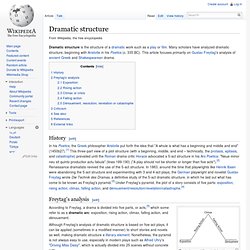
Exposition[edit] Rising action[edit] In the rising action, a series of related incidents build toward the point of greatest interest. Climax or crisis[edit] The climax is the turning point, which changes the protagonist’s fate. Falling action[edit] China Miéville on Novel Structure for Beginners. Catharsis. Dramatic uses[edit] Purgation and purification[edit] In his works prior to Poetics, Aristotle had used the term catharsis purely in its medical sense (usually referring to the evacuation of the katamenia—the menstrual fluid or other reproductive material).[10] Here, however, he employs it as a medical metaphor.
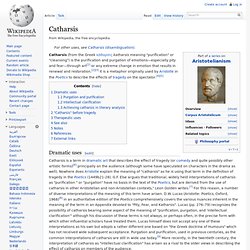
F. L. Bechdel test. A measure of the representation of women in fiction The Bechdel test ( BEK-dəl),[1] also known as the Bechdel–Wallace test,[2] is a measure of the representation of women in fiction.
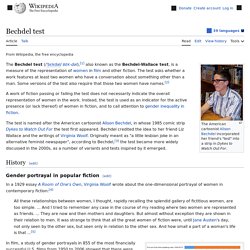
It asks whether a work features at least two women who talk to each other about something other than a man. The requirement that the two women must be named is sometimes added.[3] About half of all films meet these criteria, according to user-edited databases and the media industry press. Chekhov's Gun. Chekhov's Gun. 6 Ways You're Botching Your Dialogue. [Image's facepalm shot courtesy of Striatic.]

You want to write better dialogue. You've learned a few tricks of the trade. Great work so far, but are you unwittingly sabotaging your work, leaving only stilted, one-dimensional dialogue for your readers? Here are six painfully common ways writers botch their dialogue. 1. As writers develop, they learn to write dialogue that shows off each character's personality. Let’s Read The Name of the wind: ch.1. Good Writing vs. Talented Writing. Tower of God 144 - Read Tower of God 144 Online - Page 29. Don’t make fun of renowned Dan Brown. ManhattanGames. Hourly Story Seeds (StithThompson) na Twitteru... Bullies Called Him Pork Chop. He Took That Pain With Him And Then Cooked It Into This. Passionate Reason the blog of author L.E. Henderson: How I Lost My Guilt and Became Addicted to Writing. Since early childhood, I wanted to be a writer.
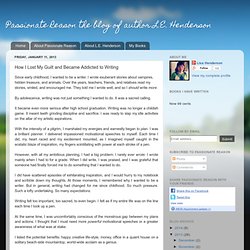
I wrote exuberant stories about vampires, hidden treasure, and animals. Over the years, teachers, friends, and relatives read my stories, smiled, and encouraged me. They told me I wrote well, and so I should write more. By adolescence, writing was not just something I wanted to do. The 3 Most Common Uses of Irony. 5 Tips for Writing Kick-Ass Characters. Bryan Cranston as Walter White Characters make the story.
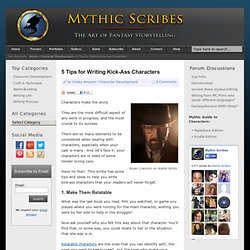
Escapist fiction. Escapist fiction is fiction which provides a psychological escape from thoughts of everyday life by immersing the reader in exotic situations or activities.
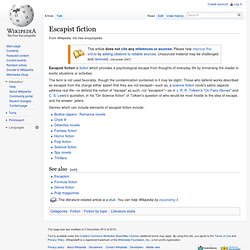
The term is not used favorably, though the condemnation contained in it may be slight. Those who defend works described as escapist from the charge either assert that they are not escapist—such as, a science fiction novel's satiric aspects address real life—or defend the notion of "escape" as such, not "escapism"—as in J. R. R. Writing Prompts That Don't Suck. Semiotics. Semiotics frequently is seen as having important anthropological dimensions; for example, Umberto Eco proposes that every cultural phenomenon may be studied as communication.[2] Some semioticians focus on the logical dimensions of the science, however.

They examine areas belonging also to the life sciences – such as how organisms make predictions about, and adapt to, their semiotic niche in the world (see semiosis). In general, semiotic theories take signs or sign systems as their object of study: the communication of information in living organisms is covered in biosemiotics (including zoosemiotics). Syntactics is the branch of semiotics that deals with the formal properties of signs and symbols.[3] More precisely, syntactics deals with the "rules that govern how words are combined to form phrases and sentences".[4] Terminology[edit] Ferdinand de Saussure, however, founded his semiotics, which he called semiology, in the social sciences: History[edit] Formulations[edit] Branches[edit] Notes. Vonnegut. Depth vs. Complexity. Neil Gaiman's 8 Rules of Writing. By Maria Popova In the winter of 2010, inspired by Elmore Leonard’s 10 rules of writing published in The New York Times nearly a decade earlier, The Guardian reached out to some of today’s most celebrated authors and asked them to each offer his or her commandments.
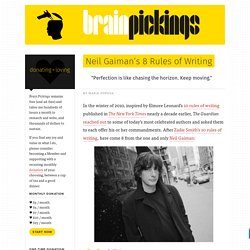
After Zadie Smith’s 10 rules of writing, here come 8 from the one and only Neil Gaiman: WritePut one word after another. Find the right word, put it down.Finish what you’re writing. F. Scott Fitzgerald on the Secret of Great Writing. Inkedexistence comments on How to make meaningful/good conversation? Politický humor, politika, politické komentáře. Religion in Games (Part 2) Religion in Games (Part 1) Combining Genres. Counter Play. Horror Protagonists. Fuck Peter Pan. Q : Who are you and what is this blog ? I’m Boulet, a french cartoonist living in Paris. I’ve had about 20 books published, most of them for young readers. I also worked on two books of the “Dungeon” series with Lewis Trondheim and Joann Sfar (available in English, ask at your local comic shop). This blog is an attempt to translate my french blog ” bouletcorp.com “. Monomyth.
Joseph Campbell's monomyth, or the hero's journey, is a basic pattern that its proponents argue is found in many narratives from around the world.
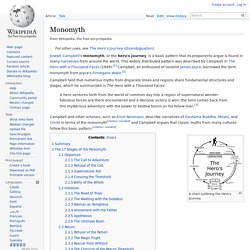
This widely distributed pattern was described by Campbell in The Hero with a Thousand Faces (1949).[1] Campbell, an enthusiast of novelist James Joyce, borrowed the term monomyth from Joyce's Finnegans Wake.[2] Campbell held that numerous myths from disparate times and regions share fundamental structures and stages, which he summarized in The Hero with a Thousand Faces:
Time Vulture. Suspension of disbelief. Suspension of disbelief or willing suspension of disbelief is a term coined in 1817 by the poet and aesthetic philosopher Samuel Taylor Coleridge, who suggested that if a writer could infuse a "human interest and a semblance of truth" into a fantastic tale, the reader would suspend judgement concerning the implausibility of the narrative. Suspension of disbelief often applies to fictional works of the action, comedy, fantasy, and horror genres. Cognitive estrangement in fiction involves using a person's ignorance or lack of knowledge to promote suspension of disbelief. The phrase "suspension of disbelief" came to be used more loosely in the later 20th century, often used to imply that the burden was on the reader, rather than the writer, to achieve it. This might be used to refer to the willingness of the audience to overlook the limitations of a medium, so that these do not interfere with the acceptance of those premises.
Coleridge's original formulation[edit] Terry Pratchett: My daughter Rhianna will take over the Discworld when I'm gone. Who is running for leader? THE END. Básnické figúry a trópy ~ Literatúra - Referáty. Tower of God. I have something that I fear more than death... Fictional Science: 100 Glaring Logical Issues With Prometheus.
Jacob (Loganville, WI)'s review of The Wise Man's Fear. Have you ever read a book that affected you so much, you had to stop reading for a while? : books. Showed my English teacher this picture after a long discussion over the meaning of a book we were reading. She was not amused. : funny. Tolkien: Allegory and Applicability. Aesthetics of Play. I just rewatched Prometheus. I really don't get the amount of hate that surrounded the movie when it first came out. : movies. Tim Minchin - Storm. I lost a few brain cells from the bad lyrics post, so let's get them back. What are the best lyrics you have ever heard? : Music. Prometheus - Everything explained and analysed *SPOILERS* : movies.
They Became What They Beheld: Medium, Message, Youtubery. Avoid this. Starting Off Right. Theme. Poetry - spoken word, literature code, less is more. Writing. Mechanics as Metaphor (Part 1) Zamros comments on Sent hundreds of messages, only 1 or 2 responses. AMIDOINITWRONG. Movies Recipes.